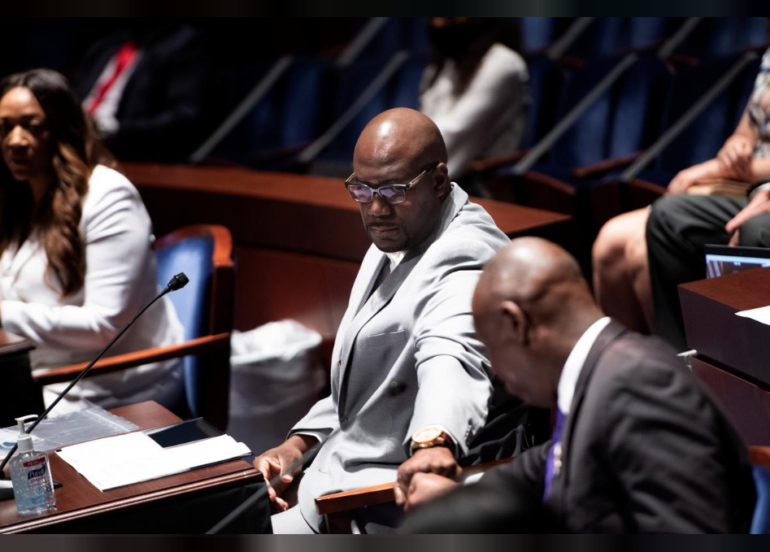George Floyd’s younger brother took his grief to the U.S. Congress on Wednesday with an impassioned plea that lawmakers not let his brother’s death be in vain, lamenting that he “didn’t deserve to die over 20 dollars” in what he called a lynching.
As the Democratic-led U.S. House of Representatives took up the issues of police violence and racial injustice in America, Philonise Floyd appeared before the first congressional hearing since his brother’s death in Minneapolis sparked protests around the world. A day before, Philonise Floyd had just buried the man he called his “personal superman” at a funeral that drew hundreds of mourners.
“They lynched my brother. That was a modern-day lynching in broad daylight,” Philonise Floyd, 42, of Missouri City, Texas, near Houston, told the committee, his voice breaking with emotion.
“His life mattered. All our lives matter. Black lives matter,” he added, wiping away tears.
The House is moving forward with sweeping reform legislation that could come to a vote by July 4, while Senate Republicans are crafting a rival plan.
The session, led by House Judiciary Committee Chairman Jerrold Nadler, was meant for Democrats to review the Justice in Policing Act, a far-ranging package of proposals amid a national debate on policing and racial inequality.
George Floyd, a 46-year-old Houston native who had worked security at nightclubs, was unarmed when taken into custody outside a market where an employee had reported that a man matching his description tried to pay for cigarettes with a counterfeit bill.
“George wasn’t hurting anyone that day. He didn’t deserve to die over 20 dollars. I’m asking you, is that what a black man’s worth? 20 dollars? This is 2020. Enough is enough,” his brother said. “It is on you to make sure his death is not in vain.”

“I’m here to ask you to make it stop. Stop the pain,” Philonise Floyd testified. “George called for help and he was ignored. Please listen to the call I’m making to you now, to the calls of our family and the calls ringing on the streets of all the world.”
Police officer Derek Chauvin was fired after the incident and charged with second- and third-degree murder and manslaughter. George Floyd and Chauvin worked as security personnel at the same nightclub.
Philonise Floyd said Chauvin knew his brother and killed him with premeditation “just because he didn’t like him,” adding that “it has to have something to do with racism.”
Political divide
The hearing highlighted divisions in Congress and the country between those who want broad changes to policing practices and those who defend the work of law enforcement and blame any problems on, as Republican Representative Mike Johnson put it, a “few bad apples.”
While several Republicans pledged cooperation and voiced support for a pivotal provision that would scale back so-called qualified immunity protections that shield police from lawsuits by people suing for damages, it is unclear whether Democrats and Republicans will eventually overcome partisan differences to pass legislation that President Donald Trump would be willing to sign.
White House spokeswoman Kayleigh McEnany, who said the Republican president may take policy action on race and policing through an executive order, called reduced qualified immunity a “non-starter.” McEnany said Trump’s administration has nearly finalized plans to address police brutality that could be made public within days.
Rev. Darrell Scott, who is part of Trump’s national diversity coalition, blasted activists’ push to dismantle police departments as “one of the most unwise, irresponsible proposals” ever.
During the hearing, lawmakers also heard testimony from civil rights and law enforcement leaders.
“The vast, vast majority of law enforcement officers are responsible, hard-working, heroic first responders,” added Representative Jim Jordan, the committee’s top Republican.
Scott noted he, like many black men, has been pulled over by police for “driving while black,” as he put it.
“I could very easily have been George Floyd,” he testified. “However, I do not recommend throwing out the baby with the bathwater.”
Those who testified also included Angela Underwood Jacobs, the sister of a black law enforcement officer, Dave Patrick Underwood, who was shot and killed while guarding a federal courthouse in California during the protests that followed Floyd’s death.
A former Republican candidate for Congress, she called for justice for Floyd and for her brother. While she said the idea of defunding the police was “ridiculous,” she also urged the lawmakers to find answers.
(With input from AP, Reuters)
 CGTN America
CGTN America